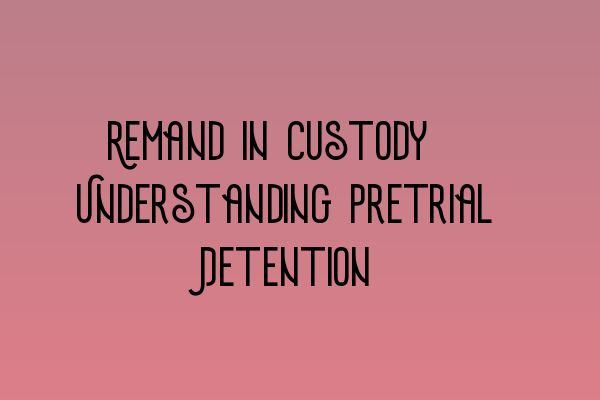Remand in Custody: Understanding Pretrial Detention
Welcome to the SQE Criminal Law & Practice Law UK blog. In this post, we will discuss a crucial aspect of the criminal justice system – remand in custody and the concept of pretrial detention. Understanding these terms is essential for both aspiring solicitors and legal professionals.
When a person is arrested and charged with a criminal offense, there are various factors that the court considers in deciding whether the accused should be remanded in custody or released on bail. These factors include the seriousness of the offense, the likelihood of the accused absconding, and the potential risk to public safety.
What is Remand in Custody?
Remand in custody refers to the detention of an accused person in a prison or correctional facility while awaiting trial. It is an interim measure taken by the court to ensure the accused’s appearance during court proceedings.
Pretrial detention, also known as remand, can have significant consequences for the accused and should not be taken lightly. Being held in custody means the accused is deprived of their freedom and kept away from their family, employment, and community.
Factors Influencing Remand Decisions
The decision whether to remand an accused person in custody or grant them bail is made on a case-by-case basis. There are several factors that the court considers, including:
- Seriousness of the Offense: The court takes into account the nature and severity of the alleged crime. More serious offenses increase the likelihood of the accused being remanded in custody.
- Flight Risk: The court considers the likelihood of the accused absconding if released on bail. Factors such as previous convictions, ties to the community, and access to financial resources are taken into account.
- Public Safety: The potential risk to public safety is also a crucial factor. If the court believes that releasing the accused on bail may pose a threat to the community, they are more likely to remand the accused.
It is important to note that the court’s primary concern is ensuring the fair administration of justice while balancing the rights of the accused and the protection of society.

Challenges Faced by Those in Pretrial Detention
Individuals held in pretrial detention face several challenges. These challenges include:
- Prolonged Detention: The length of pretrial detention can vary significantly, depending on various factors such as court congestion and the complexity of the case. For the accused, this may mean being held in custody for months or even years before their trial.
- Impact on Employment and Personal Life: Being detained can have severe consequences on an individual’s employment and personal life. They may lose their job, strain relationships with family and friends, and experience mental health issues.
- Access to Legal Representation: Adequate legal representation is crucial for a fair trial. However, individuals in pretrial detention may face challenges in accessing and communicating with their legal counsel.
It is essential for solicitors and legal professionals to be aware of the challenges faced by those in pretrial detention in order to effectively represent their clients and ensure a fair and just legal process.
Working towards Criminal Justice Reform
Recognizing the issues associated with pretrial detention, there is a growing movement for criminal justice reform in many jurisdictions. Reform efforts aim to address the excesses of remand in custody and promote alternatives such as supervised release, electronic monitoring, and community-based programs.
“Criminal justice reform plays a crucial role in ensuring a fair and efficient legal system that respects the rights of all individuals.”
The SQE Criminal Law & Practice Law UK is committed to promoting a fair and just legal system. As aspiring solicitors, it is our duty to advocate for the rights of our clients and work towards a more equitable criminal justice system.
If you would like to learn more about criminal law and practice, please check out our related articles:
- SQE 1 Practice Exam Questions
- SQE 1 Practice Mocks FLK1 FLK2
- SQE 2 Preparation Courses
- SQE 1 Preparation Courses
- SRA SQE Exam Dates
Thank you for reading, and we hope you found this post informative. Stay tuned for more updates from SQE Criminal Law & Practice Law UK!
